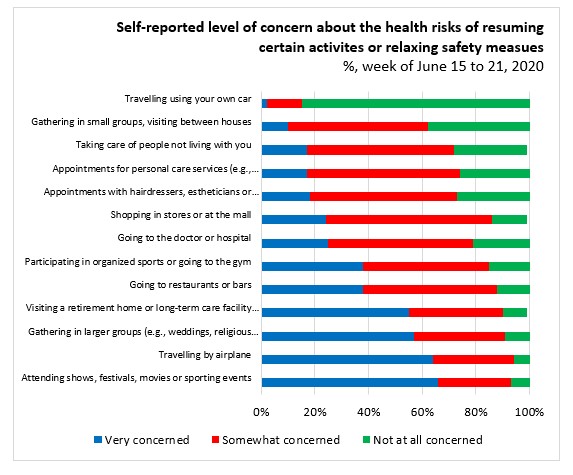The Economics and Statistics Division maintains archives of previous publications for accountability purposes, but makes no updates to keep these documents current with the latest data revisions from Statistics Canada. As a result, information in older documents may not be accurate. Please exercise caution when referring to older documents. For the latest information and historical data, please contact the individual listed to the right.
<--- Return to Archive
For additional information relating to this article, please contact:
July 27, 2020STUDY: CONCERNS OVER RESUMING ACTIVITIES IN CANADA Today, Statistics Canada released a new study “Concerns over resuming activities in Canada” that provides information on how comfortable Canadians are about resuming everyday life activities during a pandemic.
The data for this study come from Statistic Canada’s third iteration of the Canadian Perspectives Survey Series (CPSS) which asked a sample of respondents, representative of the Canadian population, about their level of concern with resuming certain activities, as well as the measures they intended to adopt to reduce the risk of COVID‑19 transmission during the week of June 15 to 21.
As provinces started relaxing some of the COVID-19 safety measures, many people are eager to resume their usual activities including social and recreational activities. However, many people may feel torn between the need to resume their activities and the fear of a second wave of the virus.
The risk of contracting COVID‑19 is known to vary depending on the type of activity, the number of people involved and whether it takes place indoors or outdoors. The results of the survey showed that Canadians’ level of concern varied significantly by activity.
In the study, people who expressed a "high overall level of concern" are those who scored in the top 25 per cent of respondents for an index of overall concerns based on responses for each activity (such as attending shows, travelling by airplane, etc.). Those who were the least concerned were those who were in the bottom 25 per cent of scores for the index.
For most activities, the proportion of people who reported being “somewhat concerned” or “very concerned” ranged from 62% to 94% during the survey week, excluding travelling using their own car.

More than 6 in 10 respondents indicated being “very concerned” about the health risks of resuming shows, festivals, movies, or sporting events (66%), and travelling by airplane (64%). More than half of Canadians reported being “very concerned” about gathering in large groups (57%) and visiting a retirement home or long-term care facility for the elderly (55%).
However, only a small percentage of Canadians expressed concerns about gathering in small groups and visiting between houses (10%) or travelling using their own car (2%).
Young Canadians under the age of 35, singles, and those working outside the home were generally less likely to be "very concerned" about the health risks associated with resuming activities, while those aged 65 and older expressed the highest levels of concern.
People aged less than 35 were less likely than people aged 65 and older to be “very concerned” about the risk of resuming travelling by airplane (51% versus 78%), gathering in larger groups (48% versus 67%) and participating in sports (28% versus 51%). However, they were as concerned as people aged 65 and older about relaxing measures related to going to the doctor or hospital and about reopening stores and malls.
The study also shows that immigrants are more concerned about the health risks associated with the reopening than the Canadian-born, particularly when it comes to attending a movie or live event (81% versus 61%) or large gatherings such as weddings and religious services (70% versus 53%).
These results are consistent with findings from previous studies that showed that immigrants were generally more concerned about the social and economic consequences of the pandemic than the Canadian-born.
Overall, women and men were equally concerned about resuming activities in Canada. However, women were more likely than men to express fears about resuming travelling by airplane (68% versus 60%).
The level of concern reported by Canadians varied by province of residence showing the differences on the severity of the pandemic and the reopening strategies between provinces.
Residents of Atlantic Provinces (72%) were generally more concerned about the health risks of travelling by airplane compared to residents of British Columbia (68%) and Ontario (65%). They were also more concerned about participating in organized sports or going to the gym (39% in Atlantic Provinces compared to 29% in Quebec and 33 % in Prairies).
The study also created an overall index of concern based on responses for each activity to examine the relationship between Canadians’ level of concern and the precautions they take to limit the spread of COVID‑19. Those who expressed a “high level of concern” were those who scored in the fourth quartile of concern.

People with a high degree of concern were also significantly more likely to choose to get a COVID‑19 vaccine (73%), once it becomes available, than those who expressed little concern (49%) about resuming activities in Canada.
Those who were least concerned were half as likely to want to wear a mask in public places (35%) as people who expressed a high level of concern (86%). However, many governments in Canada made it mandatory to wear masks in indoor public spaces since the survey was conducted.
The gaps between the different levels of concern were smaller for basic preventive measures such as “washing hands more often” and “self-isolating if exhibiting symptoms of COVID‑19.”
Source: Statistics Canada, Study: Concerns over resuming activities in Canada
<--- Return to Archive